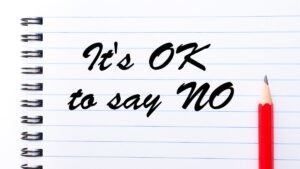The Power of “No” - Part One

“The oldest, shortest words – ‘yes’ and ‘no’ – are those which require the most thought.”
- Pythagoras
Saying "no" is important for several reasons that impact your personal well-being, relationships, and overall balance in life. By saying "no," someone is challenging the norm or standing up for their own needs, values, or boundaries, even when it may feel difficult to do so. Saying no is crucial because it helps protect your time, energy, and mental health while maintaining boundaries, authenticity, and healthy relationships. It is a key skill for personal empowerment, well-being, and long-term success. By learning when and how to say no, you create a life that aligns with your true priorities and values.
In “The Power of No” co-authored by James Altucher and Claudia Azula Altucher, the authors explore how saying no can transform your life by helping you set boundaries, prioritize your well-being, and focus on what truly matters. The authors argue that many people say yes out of fear, obligation, or guilt, and learning to say no is key to personal freedom and happiness. They encourage readers to say no to protect their time, energy, and peace of mind, allowing them to pursue meaningful goals and relationships.
Why Say NO?
Protects Your Time and Energy
If you say yes to everything, you may become overwhelmed, leading to burnout and stress. Saying no helps you prioritize your time and energy for the things that matter most to you. By declining unnecessary tasks, you can focus on what is genuinely important in your personal and professional life, ensuring your efforts are aligned with your values and goals. When you say yes to too many requests, projects, or favors, you spread yourself thin. This can lead to physical and mental exhaustion because you are constantly juggling multiple tasks, which diminishes your energy reserves. Greg McKeown in “Essentialism,” argues that saying no helps you focus on the most important tasks, allowing you to channel your energy into activities aligning with your values and goals, preventing burnout. A question McKeown introduces in his book is to ask yourself which problem do you want to have? We might disappoint someone when we say no and yet if we do not, we may experience burnout.
Additionally, saying no to non-essential tasks allows you to conserve energy for what truly matters. According to Michael Hyatt in “Free to Focus”, being selective about what you commit to helps you prioritize high-impact activities that require sustained focus. This prevents the scattered energy that results from switching between too many tasks. Multitasking or managing too many projects at once leads to cognitive overload, draining your mental energy. By saying no, you protect your ability to concentrate deeply on meaningful work, thus increasing both your productivity and energy.
Finally, if you always say yes, particularly in a professional setting, you may take on more work than you can manage, which can lead to burnout. Saying no when necessary, helps you maintain sustainable productivity over the long term. Successful individuals often attribute their accomplishments to being selective about what they say yes to. By strategically saying no to distractions, you can focus on high-value opportunities that align with your long-term goals.
Strengthens Decision-Making Skills
Saying no helps you become more deliberate about how you spend your time and make decisions that align with your long-term objectives. Many people feel regret or frustration after saying yes to something they did not want to do. By confidently saying no, you reduce the chances of feeling this way. Regularly saying no helps develop strategic thinking. When you are clear on what to decline, you are also refining your ability to anticipate the consequences of your decisions. This helps you make choices that not only work in the short term but also support your long-term objectives.
Daniel Kahneman in “Thinking, Fast and Slow” discusses decision fatigue and the importance of conserving mental energy for important decisions. Saying no can prevent decision fatigue by reducing the number of trivial decisions you have to make throughout the day, allowing you to focus your cognitive resources on more critical decisions. Kahneman’s research shows that by reducing the number of choices (through saying no), you can make better, more informed decisions when it really counts.
Supports Mental Health
Overcommitting or agreeing to things you do not want to do can increase feelings of stress, anxiety, and resentment. Saying no can reduce these negative emotions and provide relief. When you say no, you are choosing to prioritize your mental and physical health. You make room for rest, recovery, and activities that recharge you, instead of feeling pressured or drained.
Continuously saying yes out of guilt, fear of disappointing others, or a desire to please can lead to “emotional fatigue” and resentment. William Ury in the “The Power of a Positive No” suggests that learning to say no helps preserve your emotional energy by preventing you from taking on tasks that you either don’t want to do or that don’t serve your interests. Saying no allows you to set boundaries that protect your emotional health. When you decline tasks that overextend you or do not align with your values, you avoid the frustration and stress of being overburdened.
Empowers Personal Growth, Authenticity and Protects Personal Integrity
Saying no builds assertiveness skills, allowing you to stand up for yourself in various situations. Assertiveness is key to self-confidence and maintaining a sense of control over your life. Many people struggle with people-pleasing behavior, always saying yes to keep others happy. Learning to say no helps you break free from this pattern and prioritize your own needs.
Saying no also allows you to be more authentic in your decisions. Instead of going along with things out of obligation, you make choices that reflect your true desires and values. The more comfortable you become with saying no, the more empowered and confident you feel in owning your choices. It reinforces your belief in yourself and your right to make decisions that benefit you. Sometimes, saying yes can lead you to situations that conflict with your personal values or ethics. Saying no helps ensure that you stay true to what you believe in and avoid compromising your integrity.
Finally, when you say no to things that do not align with your priorities, you free yourself up to give a genuine and enthusiastic yes to things that truly matter. This increases your overall satisfaction with the commitments you do make. By not overloading yourself with tasks, you can give full attention and energy to the projects and people that are most important, improving both quality and productivity.
What Are the Challenges to Saying No?
The ability or inability to say "no" often stems from a complex mix of psychological, social, and cultural factors. First, due to fear of rejection or avoidance of conflict, individuals might worry that saying "no" will lead to rejection, arguments, or tension in relationships. There is often a desire to avoid disappointing others or causing discomfort. Next many fear losing approval or being perceived as uncooperative, unfriendly, or selfish. The need to be liked or valued can make saying "no" seem risky. A third issue is that in some cultures, people are taught to be agreeable, polite, and accommodating. This conditioning can make saying "no" feel inappropriate or wrong. Fourth, some individuals feel guilty for setting boundaries, especially if they think their "no" will inconvenience or upset others. The weight of that guilt can override personal needs or desires. Perfectionism and overcommitment may keep individuals from saying no as people who strive for perfectionism or have difficulty delegating may struggle to say "no" because they want to prove their capability or avoid feeling inadequate. This can lead to taking on too much.
 In addition, highly empathetic individuals may find it hard to say "no" because they genuinely feel for others' needs and do not want to cause disappointment. They prioritize others' feelings over their own. Adam Grant in “Givers and Takers” shares that Givers may find it difficult to refuse requests because they are motivated by helping others. However, as Grant emphasizes, successful Givers learn to set boundaries and avoid being exploited by takers. Developing the ability to say no is crucial for Givers to maintain their energy and effectiveness in both personal and professional contexts.
In addition, highly empathetic individuals may find it hard to say "no" because they genuinely feel for others' needs and do not want to cause disappointment. They prioritize others' feelings over their own. Adam Grant in “Givers and Takers” shares that Givers may find it difficult to refuse requests because they are motivated by helping others. However, as Grant emphasizes, successful Givers learn to set boundaries and avoid being exploited by takers. Developing the ability to say no is crucial for Givers to maintain their energy and effectiveness in both personal and professional contexts.
Learning to say no is a powerful and essential skill for maintaining healthy boundaries, managing your time, and prioritizing your well-being. It might feel uncomfortable or even difficult at first, especially if you are used to saying yes, but you have every right to decline requests or situations that do not serve you. Learning to say "no" can also be an empowering process that involves building self-awareness, self-respect, and emotional intelligence. It often requires practicing boundary-setting and understanding that it is okay to prioritize your own well-being without guilt.